List of amphibians and reptiles of Antigua and Barbuda
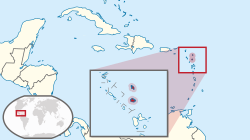
This is a list of amphibians and reptiles found in Antigua and Barbuda, an island nation in the Caribbean Lesser Antilles. It consists of the two main islands of Antigua and Barbuda, and many smaller islets, including the uninhabited Redonda.
Amphibians
[edit]There are three species of amphibian recorded in Antigua and Barbuda, only one of which is native or found on both main islands.
Frogs (Anura)
[edit]| Tree frogs (Hylidae) | |||
|---|---|---|---|
| Species | Common name(s) | Notes | Image |
| Osteopilus septentrionalis[1] | Cuban tree frog | Least concern.[2] Introduced; recently recorded as established on Antigua. | 
|
| Tropical frogs (Leptodactylidae) | |||
| Species | Common name(s) | Notes | Image |
| Eleutherodactylus johnstonei | Lesser Antillean whistling frog, coqui Antillano, Johnstone's whistling frog | Least concern. Present on both main islands. | 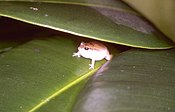
|
| True toads (Bufonidae) | |||
| Species | Common name(s) | Notes | Image |
| Bufo marinus | Cane toad, giant neotropical toad, marine toad | Least concern. Introduced to Antigua. | 
|
Reptiles
[edit]Including marine turtles and introduced species on all islands, there are 19 reptile species reported in Antigua and Barbuda, with an additional species unconfirmed. Nine species are present on both main islands. Six species are endemic to the islands of Antigua and Barbuda, of which five are only found on one island.
Turtles (Testudines)
[edit]| Tortoises (Testudinidae) | |||
|---|---|---|---|
| Species | Common name(s) | Notes | Image |
| Geochelone carbonaria | Red-footed tortoise | Present on Barbuda; probably extirpated from Antigua. | 
|
| Scaly sea turtles (Cheloniidae) | |||
| Species | Common name(s) | Notes | Image |
| Caretta caretta | Loggerhead turtle | Endangered. Recorded in water only. | 
|
| Chelonia mydas | Green turtle | Endangered. Recorded nesting on Antigua, Barbuda and some of the offshore Islands. | 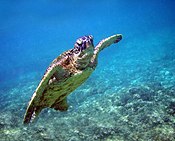
|
| Eretmochelys imbricata | Hawksbill turtle | Critically endangered. Recorded nesting on Antigua, Barbuda and some of the offshore Islands. | 
|
| Leathery sea turtles (Dermochelyidae) | |||
| Species | Common name(s) | Notes | Image |
| Dermochelys coriacea | Leatherback turtle | Critically endangered. Recorded nesting on Antigua and Barbuda | 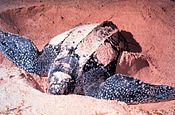
|
Lizards and snakes (Squamata)
[edit]| Geckos (Gekkonidae) | |||
|---|---|---|---|
| Species | Common name(s) | Notes | Image |
| Hemidactylus mabouia | House gecko | Introduced to Antigua. | 
|
| Sphaerodactylus elegantulus | Antigua least gecko | Regional endemic; found on both main islands and some of the offshore islands. | 
|
| Sphaerodactylus new species | Reported on Redonda, it is believed to be a separate species, but is yet to be described. | ||
| Thecadactylus rapicauda | Turnip-tailed gecko | Found on both main islands and some of the offshore islands. | |
| Iguanas and Anolids (Iguanidae) | |||
| Species | Common name(s) | Notes | Image |
| Anolis forresti | Watts' anole | Taxonomy as separate species unclear; alternately described as a subspecies of A. wattsi. Endemic to Barbuda. | |
| Anolis leachii | Leach's anole | Found on both main islands. Originally endemic; since introduced to Bermuda. | |
| Anolis nubilis | Redonda anole | Endemic to Redonda. | |
| Anolis wattsi | Watts' anole | Regional endemic. Found on Antigua; also introduced to Saint Lucia and Trinidad. | |
| Whiptails (Teiidae) | |||
| Species | Common name(s) | Notes | Image |
| Pholidoscelis atratus | Redonda ameiva | Endemic to Redonda. sometimes described as subspecies of P. pluvianotatus. | |
| Pholidoscelis griswoldi | Griswold's ameiva, Antiguan ameiva, Antiguan ground lizard | Endemic. Common on Barbuda; common only on offshore islands of Antigua. | |
| Microteiids (Gymnophthalmidae) | |||
| Species | Common name(s) | Notes | Image |
| Gymnophthalmus underwoodi | Underwood's spectacled tegu | Found on Barbuda. | |
| Skinks (Scincidae) | |||
| Species | Common name(s) | Notes | Image |
| Copeoglossum redondae[3] | Found on Redonda (endemic). | 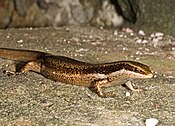
| |
| Worm snakes (Typhlopidae) | |||
| Species | Common name(s) | Notes | Image |
| Typhlops monastus | Montserrat worm snake | Regional endemic; found on both main islands and some of the offshore islands. | |
| Colubrids (Colubridae) | |||
| Species | Common name(s) | Notes | Image |
| Alsophis antiguae | Antiguan racer | Critically endangered. Endemic; found only on Great Bird Island off the coast of Antigua. Considered one of the rarest and most endangered snake species in the world; only 60-80 adults believed to remain. | |
Disputed or unconfirmed species
[edit]| Species | Common name(s) | Notes | Image |
|---|---|---|---|
| Eleutherodactylus martinicensis | Tink frog, Martinique robber frog | Near threatened. Regional endemic. Occasionally recorded on Antigua, probably due to misidentification. | 
|
| Leptotyphlops tenella | Guyana blind snake | Possibly on Antigua; mainly found in Trinidad and South America. |
Species by island
[edit]Amphibians
[edit]| Family | Species | Antigua | Barbuda | Redonda |
|---|---|---|---|---|
| Hylidae | Osteopilus septentrionalis | X | ||
| Leptodactylidae | Eleutherodactylus johnstonei | X | X | |
| Bufonidae | Bufo marinus | X |
Reptiles
[edit]| Family | Species | Antigua | Barbuda | Redonda |
|---|---|---|---|---|
| Testudinidae | Geochelone carbonaria | X | X | |
| Cheloniidae | Caretta caretta | X | X | X |
| Cheloniidae | Chelonia mydas | X | X | X |
| Cheloniidae | Eretmochelys imbricata | X | X | X |
| Dermochelyidae | Dermochelys coriacea | X | X | X |
| Gekkonidae | Hemidactylus mabouia | X | ||
| Gekkonidae | Sphaerodactylus elegantulus | X | X | |
| Gekkonidae | Sphaerodactylus new species | X | ||
| Gekkonidae | Thecadactylus rapicauda | X | X | |
| Iguanidae | Anolis forresti | X | ||
| Iguanidae | Anolis leachii | X | X | |
| Iguanidae | Anolis nubilis | X | ||
| Iguanidae | Anolis wattsi | X | ||
| Teiidae | Pholidoscelis atratus | X | ||
| Teiidae | Pholidoscelis griswoldi | X | X | |
| Scincidae | Copeoglossum redondae | X | ||
| Gymnophthalmidae | Gymnophthalmus underwoodi | X | ||
| Typhlopidae | Leptotyphlops tenella | ? | ||
| Typhlopidae | Typhlops monastus | X | X | |
| Colubridae | Alsophis antiguae | X |
Notes
[edit]- ^ Lindsay, K.; Cooper, B. (2008), "Osteopilus septentrionalis becomes established on Antigua, West Indies", Applied Herpetology, 5 (1): 96–98, doi:10.1163/157075408783489176. Not recorded on Antigua (or anywhere else in the Lesser Antilles) in Malhotra & Thorpe 1999.
- ^ Conservation status, where available, is from the IUCN Red List and is indicative of the status of the species as a whole, not just populations in Antigua and Barbuda.
- ^ Though reported in Malhotra & Thorpe 1999 as M. bistriata, the Redonda population has been reassigned.
References
[edit]Note: All species listed above are supported by Malhotra & Thorpe 1999, unless otherwise cited.
- Malhotra, Anita; Thorpe, Roger S. (1999), Reptiles & Amphibians of the Eastern Caribbean, Macmillan Education Ltd., pp. 68–73, ISBN 0-333-69141-5.
